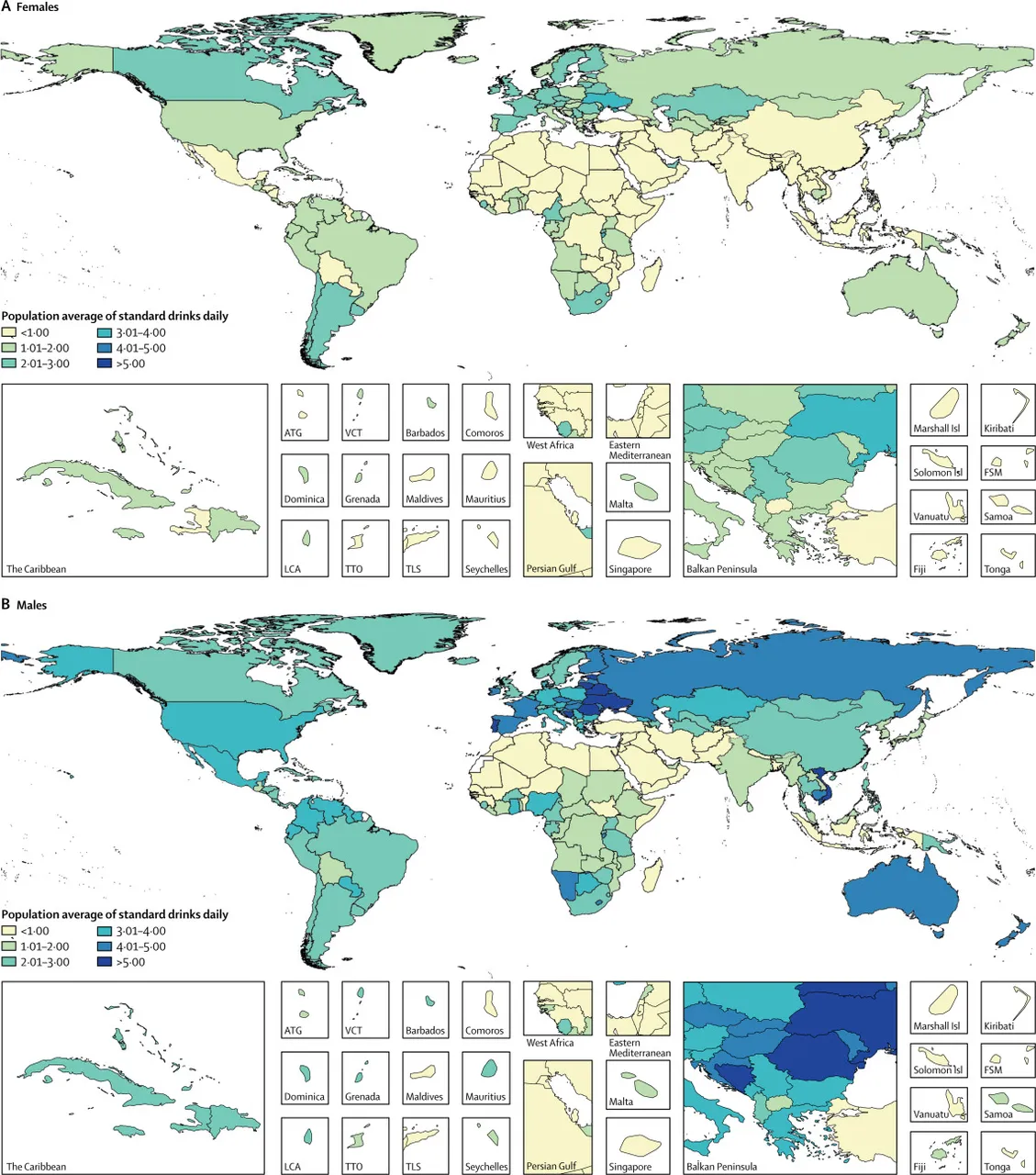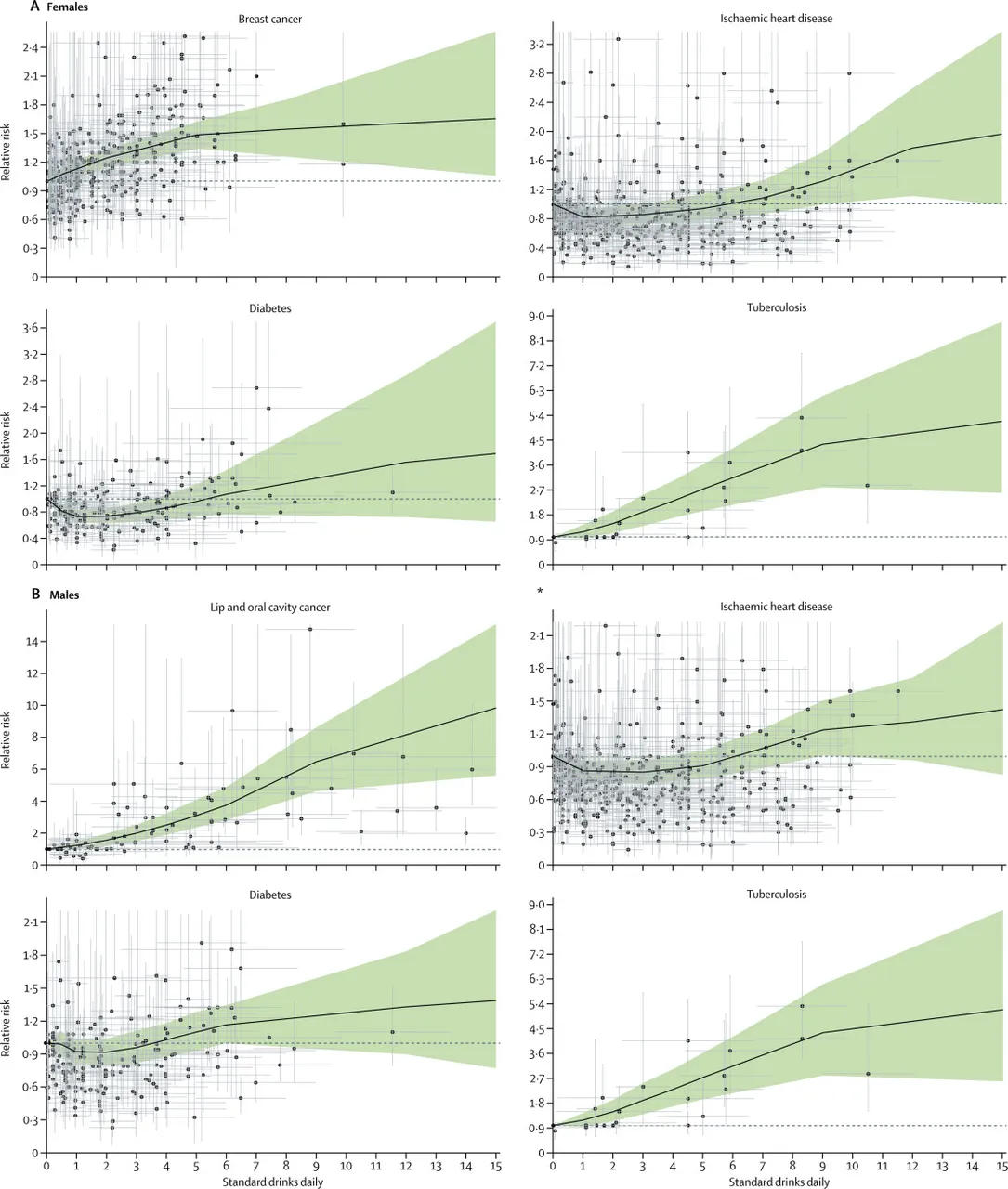I’m kinda back on track. I guess. I had to sort out some stuff during the past weeks, but I think I will be able to post more regularly now. Speaking of it: today is Tuesday. What a surprise. So, I have the perfect excuse to talk about an article which was published just a few days ago. It mainly deals with one topic: how healthy is alcohol consumption or is there even any healthy level of said consumption at all?
Drunken Master
Some of you may know my current profession: I’m a bartender. Sadly, to be frank about it. I have been working behind bars for more than five years now – and I hate doing it. But since I’m still studying, it kinda pays my bills and until I find something better, I am stuck with it. Why do I hate it? Mainly because people walk into a bar and leave their brains at the door. You wouldn’t believe the stories I could tell about some customers. Sometimes I asked myself whether the doctors released them from a hospital without checking for proper brain functions. Nobody can be THAT stupid, am I right? I also despise drunk people. They are loud, annoying and lack respect. Reminds me of children – and you all know already what I think of them.
With that being said, it should come as no surprise to you that I am also quite familiar with alcohol in general. I have my fair share of knowledge when it comes to spirits, history of drinks and the effects of alcohol – either by my own experiences, observations or just reading a lot. In fact, I have written on multiple occasions about alcohol related issues on this blog. Be it how alcohol affects your brain, how wrong and deceiving journalists can be whenever they write about alcohol consumption (or science in general) or that red wine is actually not as good for your health as you may have thought.
Even while working as a bartender I made myself no illusions: I knew alcohol was bad for my health, but since I really enjoy the taste I drank it nevertheless. Drank. Past. Recently I decided to quit drinking alcohol for good. I “only” drank for about five years, since I started with it when I was 21 – but during the last years, I definitely consumed way more alcohol than any health guide would ever recommend. Abolishing alcohol is probably one of the most important steps of me getting out of this whole “working-at-bars-thing” as well. I have to admit, I’m somewhat proud of myself to be able to make this decision – especially considering my current profession. Although I had no physical dependency, the psychological side-effects of permanent withdrawal are sometimes a bit tough to handle. And that’s without the peer-pressure.
A short while after I made that decision a study was published in The Lancet - one of the most important medical journals. Title of the paper?
Alcohol use and burden for 195 countries and territories, 1990–2016: a systematic analysis for the Global Burden of Disease Study 2016(1)
What a coincidence.
Luckily, the paper is open access which gives me the opportunity to discuss its implications in detail. Spoiler alert: if you like to drink alcohol, you will not like the results of this study.
The spirit is willing and the flesh is weak
If you read my article about the protective effects of red wine, you already know about some issues regarding alcohol consumption in order to obtain a better health in general.
There I already discussed some of the current research associated to that matter. A meta-analysis by Zhao et al. in 2017(2) made it relatively clear what to think about red wine consumption for cardio-protective reasons:
They analysed 45 different studies connected to this topic and came to some interesting conclusions. 38 of these studies were confounded by methodical weaknesses, especially when it came down to measure former and/or occasional drinkers. In addition to that, 16 studies were using an unusual way of measuring the average amount of alcohol intake per day.
These weaknesses led, among other things, to the conclusion that the idea of cardio-protective effects of alcohol consumption is still not more than an interesting hypothesis, which should be met with scepticism.
But, yet again, there are researchers who say quite the opposite. Haseeb et al. (2017)(3) argue in favour of a moderate consumption (in accordance to the WHO guidelines), since the available evidence seem to suggest protective effects against cardiovascular diseases. Take note though, they did only a review of the available research and not an in-depth analysis of the conducted studies (like Zhao et al. did) including possible weaknesses. Especially the human trials were quite often methodological weak. Even if there are some beneficial effects regarding the protection against cardiovascular diseases, the intake of alcohol has several side-effects, which are indeed quite detrimental to one’s health.
It’s probably not worth being protected against heart diseases when you die from liver failure or cancer, which was caused by long-term alcohol consumption.
Alcohol is most likely not healthy and can lead to severe implications for your own health.
A new player on the field
And this is where the new, already mentioned study enters the stage.
It’s probably the most extensive and most detailed analysis of the effects of long-term alcohol consumption so far.
The researchers analysed data between 1990 and 2016 which included 694 data sources – this equalled a combined study population of a whopping 28 million people. So, they had a lot of data to work with. See their methods for further details.
What did they do exactly?
They provided a meta-analysis of relative risks associated with alcohol consumption.
 If RR >1, the symptoms are more likely to occur in the group which received the treatment – the rest should be self-explanatory. |
|---|
They estimated a risk relative to the amount consumed ranging between 0 and 12.5 standard drinks daily (one drink equals to 10 g of pure ethyl alcohol). To give you some perspective: the CDC currently recommends(4) up to one drink for women and two for men daily. As you may have guessed – in some regions of the world people are far beyond that.

With that in mind you should not be surprised by the following either. According to the paper about 2.8 million deaths in 2016 can be attributed to alcohol consumption – which are 2.2% of all female deaths and 6.8% of males respectively (age-standardised). This also means alcohol was able to achieve rank seven of the leading risk factors which are responsible for an early death or disability.
The authors of the study made the sincerity of this issue visible once more using fancy diagrams:

What does that mean for your health?
Well, only if you aim to reduce your relative risks of diabetes or ischaemic heart disease it might be a good idea to consume 0.83 standard drinks if you are a man – or 0.92 as a woman (it probably does not count, if you only identify yourself as either one…). As for everybody else: the total amount of alcohol consumption to minimize risks for your health is nothing else but zero.
ZERO.
Z.E.R.O.
According to science, you cannot justify your drinking habits with “doing something for your health” any longer. And even if you want to protect yourself against diabetes and ischaemic heart disease via alcohol consumption – I and the study’s authors would strongly advice against it. The risks of contracting alcohol-associated cancers are increasing monotonically with consumption. So, the possible positive effects cannot stand a chance against the negative ones.
Ouch.
Are you supposed to live a life in constant sobriety now? Certainly not. I had personal reasons for quitting drinking but I’m probably the last person who would expect you to do the same.
I am not here to tell you what to do. You are probably old (and hopefully smart) enough to make your own decisions. I am here to enable you making informed decisions. If you are aware of the risks associated with alcohol consumption and still decide to drink – sure, go for it. I won’t judge. It’s your life and you are the only one who should be responsible for that.
Context and interpretation
When I first read about (not the study itself) the paper I also took a look at some of the comments below the newspaper article. Oh, boy. What a mistake. I should not have done that.
There they were. The scientific illiterate. Many of them said things like ”Well, duh. Life ends deadly anyway, so, we can just have fun.” or ”Wow, today this study says that and tomorrow another study says something completely different – I won’t listen to any scientist and prefer my guts.”
And so on.
Luckily, I resisted my urges and did not start a discussion about how scientific research is being done and why correlation does not equal causation. Would have probably been a waste of time.
What people fail to understand over and over again is how to interpret this kind of data. Even if you have six drinks a day, you don’t have to contract any disease or die an early death. BUT. Your risk of experiencing exactly that will increase – it’s just up to you whether you are willing to take that risk or not.
Maybe you are among the lucky ones who can drink as much as they like without ever suffering from any severe side- or long-term effects. I don’t know. You don’t know. Nobody knows for sure. It’s pure gambling. A mere flip of a coin.
Every single time you are consuming alcohol you are hoping that coin is going to flip in your favour.
Feel always free to discuss my ideas and share your own thoughts about the things I’m writing about. Nobody is omniscient and if we all walk away a bit smarter than before, we’ll have achieved a lot.
Thanks for reading and stay sceptical.

Make sure, to check out #steemstem for more science related content.
References
(1) The Lancet – Alcohol use and burden | (2) Jinhui Zhao. Tim Stockwell. Audra Roemer. Timothy Naimi. Tanya Chikritzhs. Alcohol Consumption and Mortality From Coronary Heart Disease:An Updated Meta-Analysis of Cohort Studies | (3) Sohaib Haseeb, Bryce Alexander, Adrian Baranchuk. Wine and Cardiovascular Health A Comprehensive Review. | (4) CDC Alcohol FAQ | (5) Relative Risk
Debunk-Tuesday
